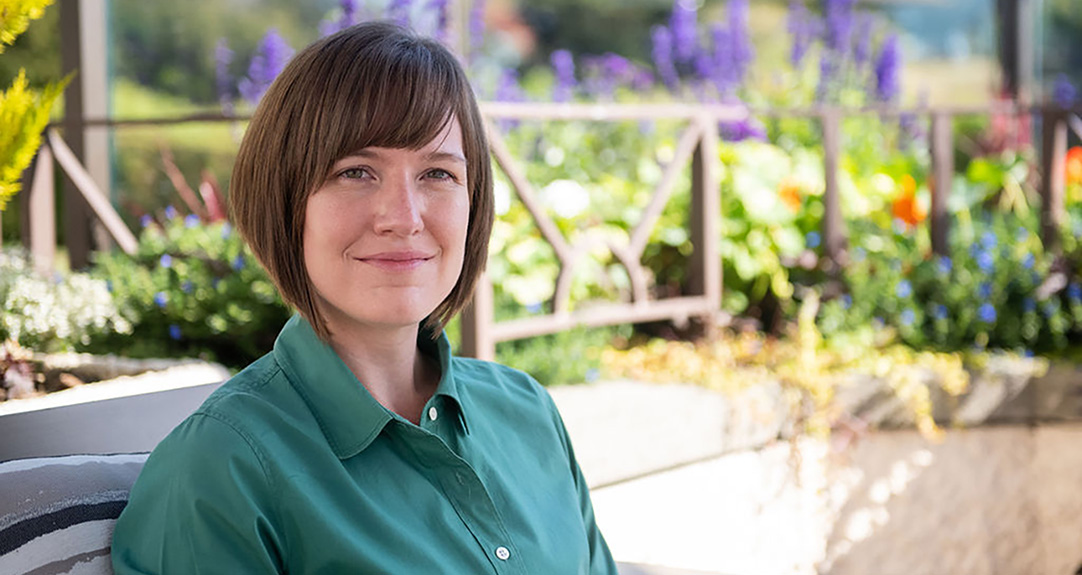Pay It Forward
Q&A with Jill Harper, FSA, CERA, FCIA, director at Moody’s Analytics
October 2021Photo: Dean Kalyan
What led you to an actuarial career?
I finished my master’s degree in 2009 and found myself looking for work in the wake of the 2008 financial crisis. I happened to find work as a computer programmer at a company that produced pension administration software, and because I had an education in mathematics, I was assigned to work on actuarial calculations. After a few months of working on these calculations, I was completely hooked on actuarial programming and decided to pursue my actuarial designations.
Tell us about your job and its responsibilities.
I am one of the programming leaders working on the AXIS software platform. My day-to-day work includes management activities as well as computer programming, so I have a lot of variety in my work, which I love.
What are the most exciting aspects of your work?
One of the best things about my job is that I get to see what many different insurance companies—and individuals within those companies—are thinking about. One day I might be thinking about changes to regulatory requirements and how to best support AXIS users through those changes, while the next day I might be considering how AXIS can support the unique product features of individual insurers. This gives me a broad view of what is going on in the actuarial community, and there are exciting new problems to think about all the time.
Video Exclusive: Jill Talks About the Benefits of Volunteering
Why do you volunteer? How does it help you on the job and in life?
I volunteer quite a bit with both actuarial organizations and local organizations within my community. My main reasons for getting involved with volunteering in the first place were to give back to the communities that support me and form connections. I’ve found that my volunteer activities have given me so much more than an opportunity to connect and give back. Because of this, I strongly recommend volunteering to new actuaries who are thinking about how to get started in their careers.
My volunteer work has pushed me outside of my comfort zones and forced me to work on soft skills that are important in today’s world, such as communication and leadership skills. Developing these skills has opened up so many new opportunities that I wouldn’t have been able to pursue had I only focused narrowly on the programming work that I was doing when I started volunteering.
Define a successful day.
To me, a successful day is a day in which I learn or teach someone else something new. I am always working as part of a team, so sharing a new skill with a teammate means we all will benefit in the long run. To me, this is a much more meaningful contribution than simply completing my day’s tasks.
Who inspires you and why?
I’m inspired by my colleagues and their enthusiasm for constant learning, and my fellow volunteers who seem to have endless energy with which to give back. One person in particular who comes to mind is the president at the golf club where I belong. His leadership style is incredibly inspiring: He is very quick to give his fellow volunteers ownership of initiatives and trusts them to run with their ideas while providing support without interfering. Experiencing this style of leadership is inspiring in my individual role, but it also has been a great source of inspiration for me as I take on more leadership roles in my career.
Any advice for those seeking to enter the actuarial profession?
My advice is to just dive in, get involved with the community and not let fear hold you back. One great way to do that is by volunteering. A common perception is that you need to be very experienced before you’re ready for volunteer roles, but I’ve found that we benefit from having diverse perspectives. Often, the insights from less experienced individuals can be disruptive in a good way.
What is the most important lesson you’ve learned during your career to date?
The most important lesson I’ve learned is to just dive into things that I’m interested in or passionate about. Early in my career, I was often cautious about getting involved in new things, and I missed opportunities for growth because of this. Volunteering has helped me realize that tasks often seem daunting at the beginning, but once you dive in, you always can find a way to contribute if you push yourself.
How do you maintain a work/life balance?
Work/life balance can be tricky, especially when you work from home and do a lot of volunteering like I do. What I’ve found is that you can always push a little extra to meet a milestone, but it is very easy to let this become a habit—which ultimately leads to being less productive. One lesson I’ve learned is to create strict boundaries: I force myself to set aside time to exercise and to prepare healthy meals every day, for example. By maintaining this discipline, I can give my full attention to my work, and I get so much more done during my working hours.
What are your hobbies or pastimes?
I love to cook, so that is one of my favorite pastimes. I’m lucky to live in a part of the world where there are a lot of outdoor activities, so I also like to spend a lot of time outside golfing, hiking and sailing. My other passion is reading fiction, and I love those quiet evenings that I get to spend with a good novel.
Statements of fact and opinions expressed herein are those of the individual authors and are not necessarily those of the Society of Actuaries or the respective authors’ employers.
Copyright © 2021 by the Society of Actuaries, Chicago, Illinois.

